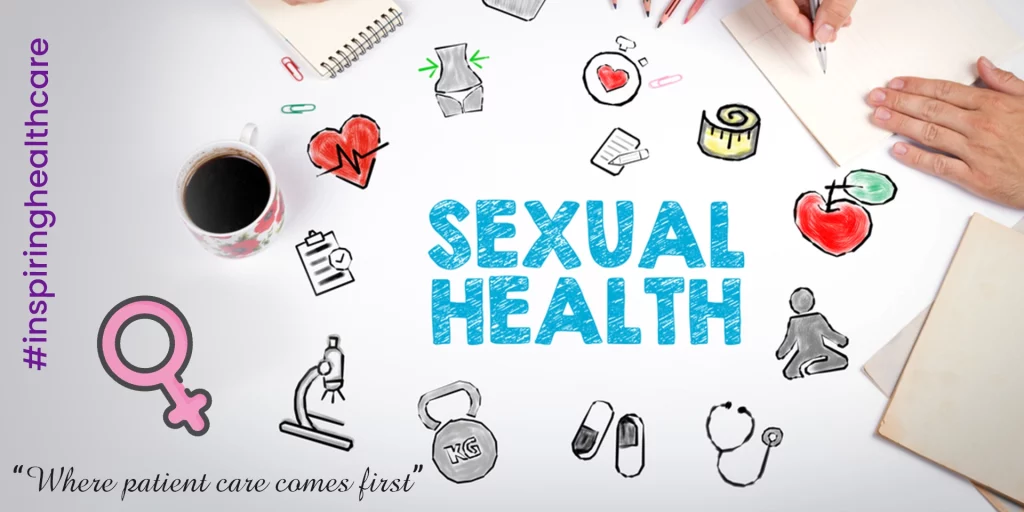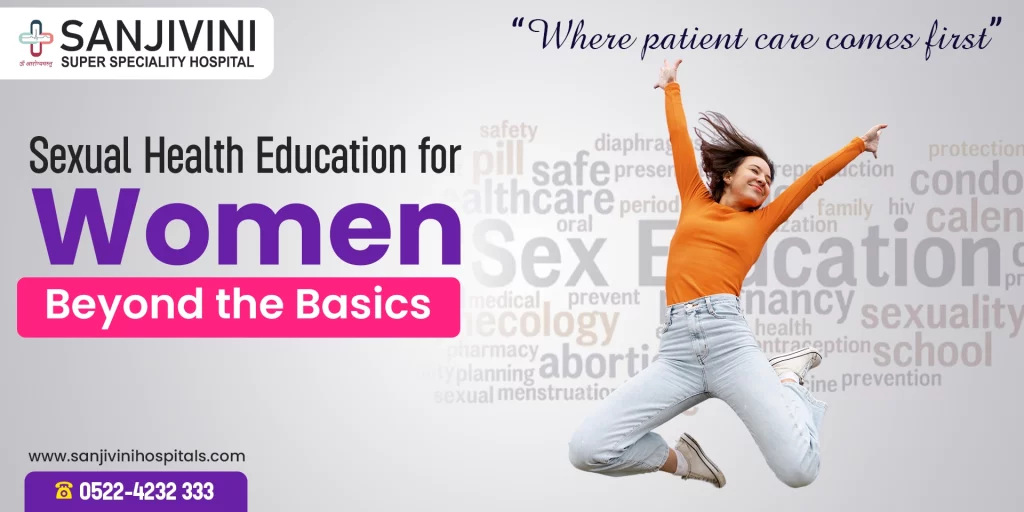Medically Reviewed by: Dr. Sonali Sharma
Understanding sexual health is vital for women’s overall well-being and empowerment. This encompasses a variety of topics, such as anatomy, consent, and overall sexual well-being. Evidence indicates that comprehensive sex education programs effectively lower rates of risky behaviors, sexually transmitted infections, and teenage pregnancy.
In this introduction, we’ll briefly highlight the significance of sexual health education for women, emphasizing how knowledge impacts their well-being and sense of empowerment.
Importance of Sexual Health Education for Women
Sexual health education is vital for women for several compelling reasons:
A. Prevention of Negative Outcomes:
- Comprehensive sexuality education significantly reduces rates of sexual risk behaviors, sexually transmitted infections, and teenage pregnancy.
B. Empowerment:
- Educating women about their bodies, sexual health, and consent fosters self-confidence and self-esteem, enabling informed decision-making and the cultivation of healthy relationships.
C. Promotion of Positive Outcomes:
- Sexual health education yields personal and interpersonal benefits, including enhanced communication skills, minimized family conflicts, and heightened sexual pleasure.
D. Addressing Social Issues:
- Comprehensive sex education empowers young women to comprehend and confront issues related to gender, sexuality, and their bodies. It equips them to navigate the impact of these issues on their mental health and relationships.
Impact of Knowledge on Overall Well-being and Empowerment
Sexual health education profoundly influences women’s overall well-being and empowerment:
A. Improved Health Outcomes:
- Comprehensive sexuality education enables women to make informed decisions about their sexual health, resulting in improved health outcomes and reduced risks of negative consequences.
B. Enhanced Self-Confidence and Self-Esteem:
- Education on their bodies and sexual health elevates women’s self-confidence and self-esteem, fostering comfort and empowerment in their relationships.
C. Positive Interpersonal Relationships:
- Sexual health education contributes to positive outcomes in interpersonal relationships, including improved communication skills, reduced family conflicts, and heightened sexual pleasure.
D. Addressing Social Issues:
- By delving into gender, sexuality, and body-related topics, comprehensive sex education equips young women to comprehend and tackle social issues. It enables them to navigate the impact of these issues on mental health and relationships.
Understanding Female Anatomy
Female Reproductive System Overview:
- Comprising internal and external organs, the female reproductive system collaborates for reproduction, pregnancy, and childbirth.
- Key components include ovaries, uterus, cervix vagina, and vulva.
- Ovaries produce vital female hormones—estrogen and progesterone—regulating sexual development, menstrual cycles, and pregnancy.
- Understanding these components is crucial for comprehending the system’s functions.
Significance of Menstrual Health
- Maintaining optimal menstrual health is vital for overall reproductive well-being.
- Throughout the menstrual cycle, ovaries release eggs, and the uterine lining thickens for potential pregnancy.
- Unfertilized eggs lead to menstruation, making monitoring menstrual health essential.
- Changes or irregularities in the cycle should be discussed with healthcare professionals.
Hormonal Changes in the Menstrual Cycle:
- Hormonal fluctuations, involving estrogen, progesterone, follicle-stimulating hormone, and luteinizing hormone, are pivotal in the menstrual cycle.
- These hormones govern functions like uterine lining development, ovulation, and the overall menstrual cycle.
- Understanding these changes is vital for monitoring reproductive health and fertility.
- Regular insights into hormonal dynamics contribute to informed reproductive health decisions.
Key Takeaways:
- The female reproductive system’s intricate collaboration facilitates fundamental life processes.
- Menstrual health serves as a crucial indicator of overall reproductive well-being.
- Hormonal dynamics, including estrogen and progesterone, play a pivotal role in regulating reproductive functions.
- A proactive approach to understanding and monitoring these aspects empowers individuals to make informed reproductive health choices.
Contraception and Family Planning
- Understanding Contraception Methods
- Contraception, or birth control, includes hormonal, barrier, and permanent methods.
- Aims to prevent pregnancy by affecting egg release, sperm-egg interaction, or altering the uterine lining.
- CDC offers a comprehensive guide on methods, effectiveness, and guidance for healthcare providers.
- Pros and Cons of Contraception Methods
- Each method has unique advantages and disadvantages.
- Hormonal methods (e.g., birth control pills) are highly effective but may have lack of compliance,
- Barrier methods (e.g., condoms) prevent both pregnancy and STIs.
- Consider factors like effectiveness, ease of use, and potential side effects when choosing.
- Informed Decision-Making in Family Planning
- Crucial to choose a method aligning with health, lifestyle, and reproductive goals.
- Comprehensive sexuality education provides accurate information for informed decision-making.
- ACOG emphasizes evidence-based, age-appropriate education to prevent unintended pregnancies and STIs.
Also Read: Understanding Menstrual Health: Tips and Advice
Safe Sex Practices
- Prioritizing Safe Sex
- Essential for preventing unintended pregnancies and reducing STI risks.
- Comprehensive sexuality education equips individuals with knowledge for informed decisions.
- Emphasizes responsible sexual behavior and dispels myths.
- Insights into Barrier Methods
- Barrier methods (e.g., condoms) prevent STIs and unintended pregnancies.
- CDC guides effectiveness and correct usage for maximum protection.
- Dispelling Safe Sex Myths
- Comprehensive education targets misconceptions, stressing consistent and correct barrier use.
- Aims to promote responsible sexual behavior and accurate information.

Common Sexual Health Issues
- Addressing STIs
- STIs spread through sexual contact, with serious health consequences if untreated.
- Comprehensive education covers common STIs, symptoms, prevention, and the importance of regular testing.
- Recognizing Symptoms and Preventive Measures
- Early detection and treatment are crucial for STIs.
- Preventive measures, such as consistent condom use and vaccination, are integral.
- Regular Check-ups for Sexual Health
- Vital for maintaining sexual health and overall well-being.
- Encompasses discussions about contraception, STI testing, and reproductive health.
- Access to quality healthcare services is essential for addressing sexual health issues.
For personalized and expert guidance on sexual health, book your consultation at Sanjivini Super Specialty Hospital, Lucknow. Our dedicated team is committed to providing comprehensive care and valuable support for your well-being. Take a proactive step towards a healthier future with Sanjivini.

